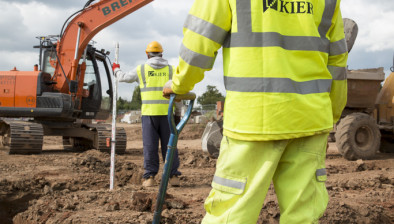Scottish projects contribute to steady progress at Kier

The continued growth of Kier Construction Scotland has helped its parent company announce a “solid” set of financial results.
For the six months to December 31 2016, Kier Group reported steady underlying revenue of just over £2 billion (down 1%) and underlying pre-tax profit of £46.3 million (up 12%).
The results were supported by the ongoing success of Kier Construction in Scotland and the north-east of England.
With a turnover in excess of £150m per annum, the business employs over 200 people from its offices in Glasgow, Aberdeen, Inverness and Newcastle and provides diverse local employment and training opportunities throughout the country.
Commenting on the results, Brian McQuade, managing director of the Scotland and north-east England arm of Kier’s Construction division, said: “We’ve performed well this year, increasing our framework and tender wins and taking a steady approach to growth and securing a strong pipeline of activity.
“Most recently we have been appointed to the four year University of Strathclyde’s Minor Works framework for projects up to the value of £750,000 and we are positioned to provide building work services at Glasgow Airport as part of their construction framework over the next three years. We have started work on a £3m industrial unit at Clyde Gateway East business park for Clyde Gateway through the Scape National Minor Works framework and we have just been appointed to work through the development proposals for the £5m Rowanbank secure health unit at Stobhill Hospital through the Health Facilities Scotland framework for NHS Greater Glasgow and Clyde.
“Education continues to be a prominent sector for Kier. We have been appointed by hub South West to develop the design and build for the new £25m Queen Margaret Academy in Ayr on behalf of South Ayrshire Council. We are currently on site delivering a number of state-of-the-art schools throughout Ayrshire, including the £43m William McIlvanney Campus at Kilmarnock, the £25m Ayr Academy and the £35m redevelopment of Marr College in Troon. We have also completed the £36m Garnock Campus for North Ayrshire Council and the £13m Caol Campus for The Highland Council. In the higher education sector, work continues to progress well on the £25m restoration of the fire damaged Mackintosh building for Glasgow School of Art and the 14m refurbishment of Edinburgh College of Art for the University of Edinburgh.
“Importantly, our commitment to the Scottish construction sector goes beyond our solid business operations. We recognise the skills shortage affecting the entire construction industry and we are increasing awareness of this diverse and hugely rewarding sector by working with a number of schools, industry bodies and local suppliers throughout the country to attract and retain more young people into construction.”

In what was a period of reorganisation for Kier Group, the accounts show a £39m profit on the £75m sale of Mouchel Consulting to WSP in October 2016 but a £33m provision for closing the Caribbean operations.
The statutory results show group revenue up 1% to £1,996m for the first half and pre-tax profit of £34.9m. Excluding Mouchel Consulting, the equivalent 2015 profit figure was just £4.3m.
From construction activities alone, Kier saw underlying operating profit rise 19% to £20.8m with a 2% operating margin (2015: 1.9%). Construction revenue was up 8% for the period to £1,017m, a new high for the company. The order book stands at £3.3bn.
In the boardroom, Phil White retires as chairman after the AGM on November 17, to be succeeded by Philip Cox, who is the chairman of Drax Group and Global Power Generation.
Kier also announced a deal with Peterborough-based housing association and care services provider Cross Keys Homes to form a housing delivery joint venture.
Haydn Mursell, chief executive, said: “Today’s results reflect the ongoing financial and operational discipline employed across the Group and the strength of our flexible, integrated business model.
“The Group has a balanced portfolio of businesses and market leading positions in regional building, infrastructure and housing. Our continued focus on simplifying the portfolio and working with clients in a collaborative way is delivering further growth opportunities. Our clients recognise this approach as a key differentiator when working with Kier.
“The Group’s breadth provides some resilience against economic uncertainty and we continue to shape Kier to focus on our core competencies. We are encouraged by the pipeline in the Property and Residential businesses and our healthy order books of approximately £9bn in the Construction and Services businesses. We remain on course to deliver our expectations for the full year and we are well positioned to achieve our Vision 2020 goals.”





















